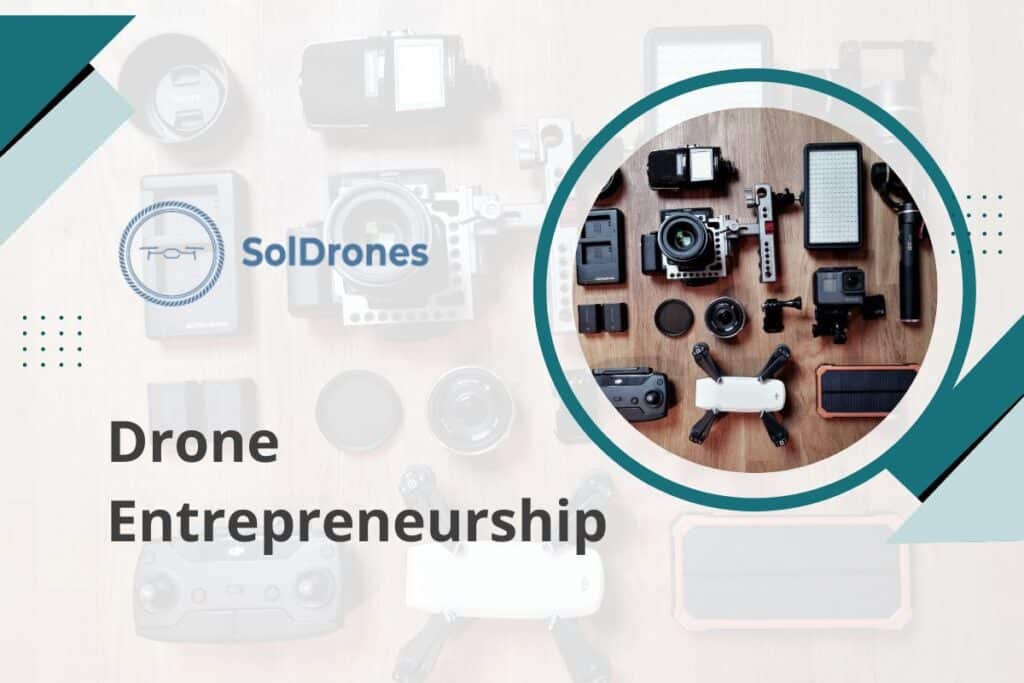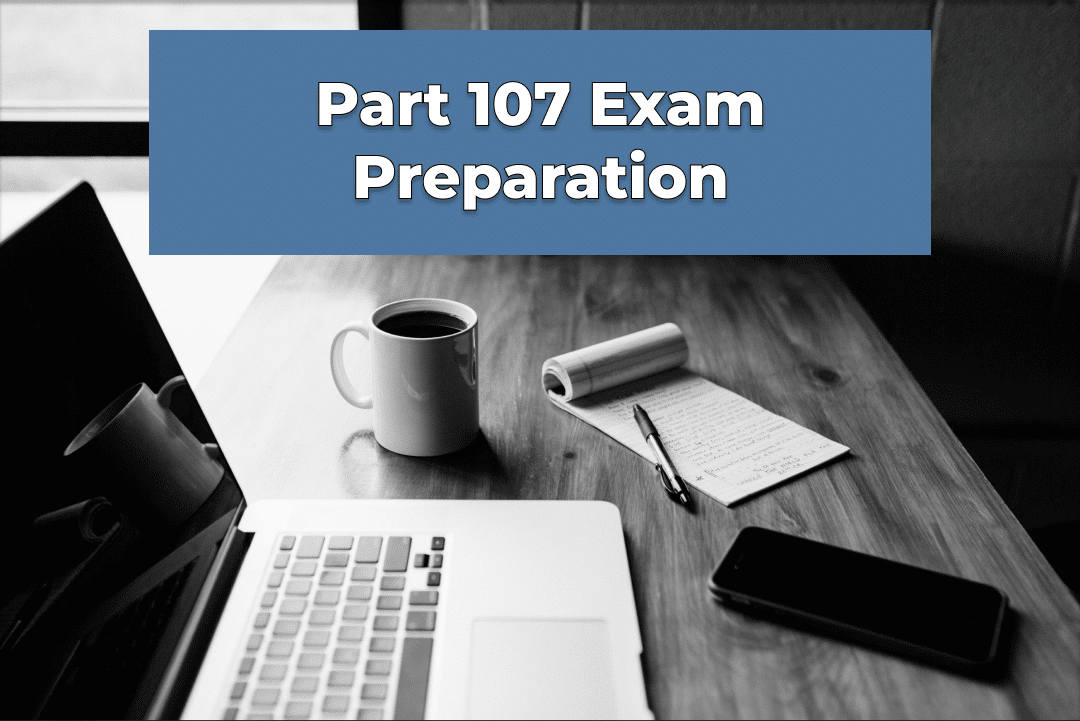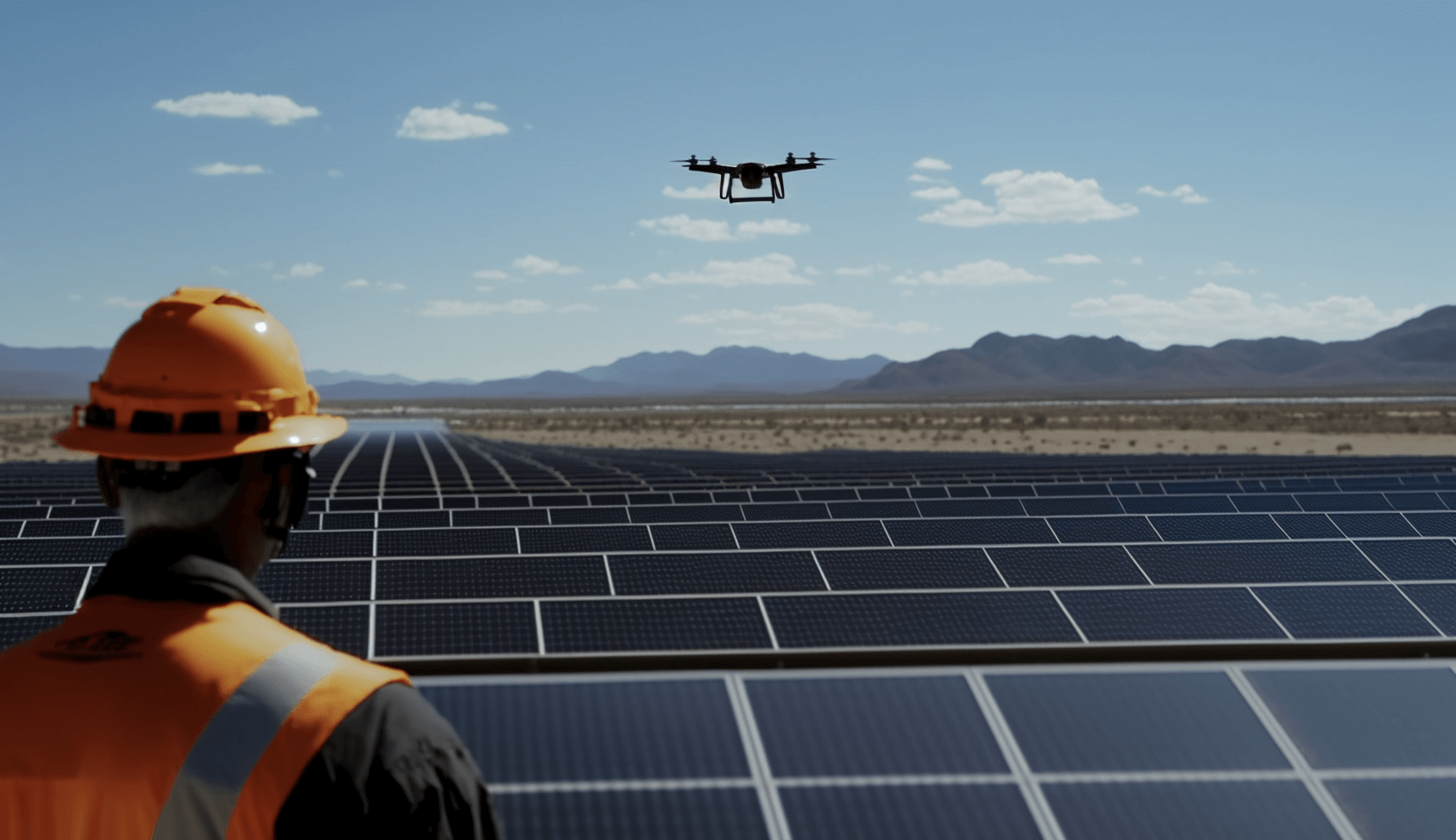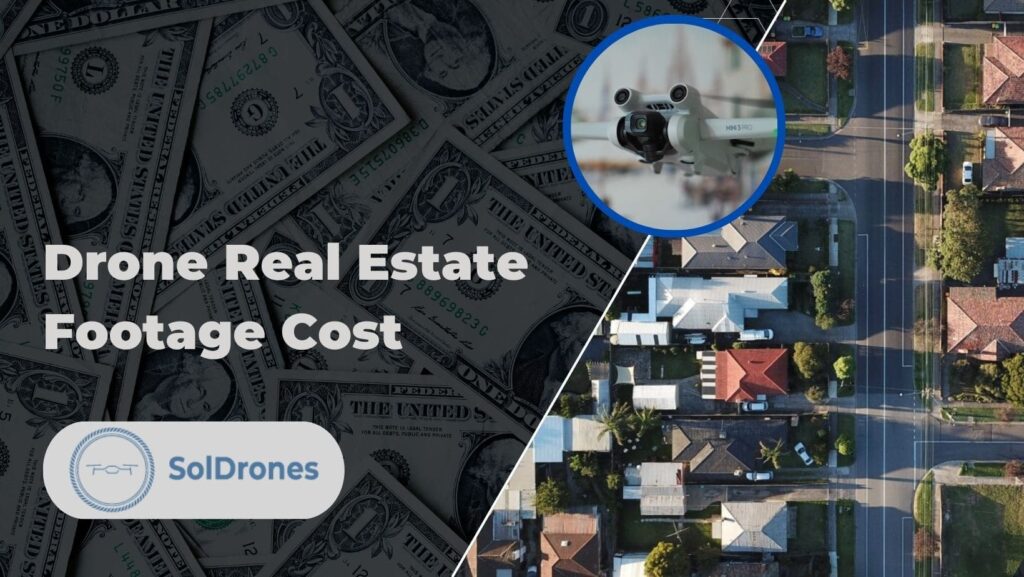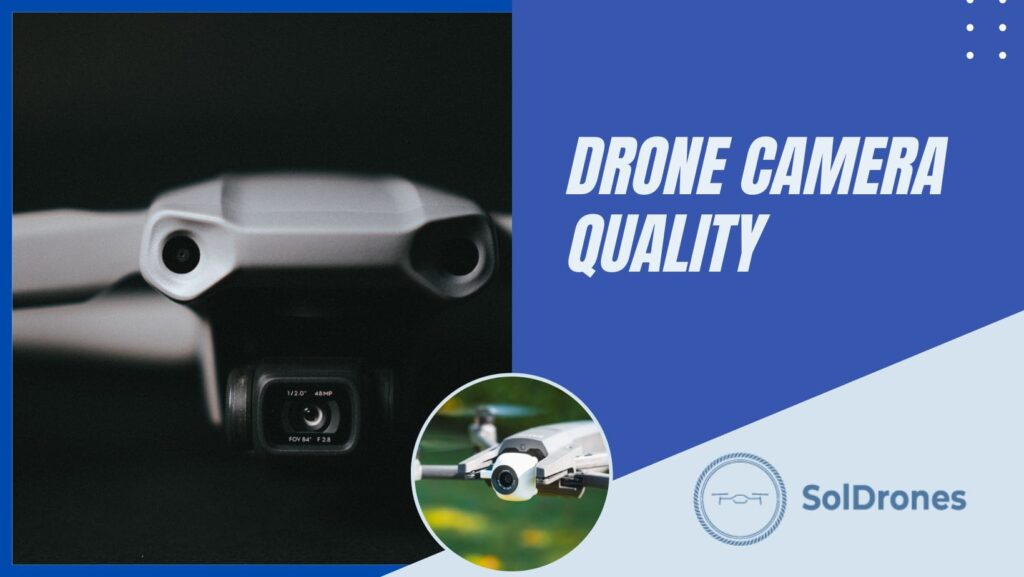As the utilization of commercial drones becomes widespread, the question of how to become a drone entrepreneur becomes increasingly relevant. The drone industry’s rapid growth and evolution have opened the door to numerous business prospects for those looking to take advantage of this cutting-edge technology.
In this article, we’ll examine the possibilities of drone entrepreneurship and provide valuable insights to equip you for success in the evolving industry.
We’ll begin by exploring the basics of drone entrepreneurship and ultimately examine how lucrative a drone business can be. Additionally, we’ll cover essential aspects such as pricing your services, starting a commercial drone business, purchasing drones and equipment, and more.
Article Highlights:
- The growing demand for drone services throughout industries is fueling the profits for savvy drone entrepreneurs
- Starting a drone business can be very lucrative if done the right way
- There are several pricing models embraced by most commercial drone businesses
What is a Drone Entrepreneur?
A drone entrepreneur is an individual who launches and runs a business based on providing services with the aid of UAVs, otherwise known as unmanned aerial vehicles. This rapidly growing industry offers various drone business opportunities, ranging from aerial photography to surveying and mapping. As technology advances, the potential applications for drones continue to expand, making it an exciting time for those looking to enter this field.
To become a successful drone entrepreneur, one must possess not only technical skills in operating UAVs but also know the legal requirements and safety protocols involved. Additionally, understanding the current market trends within the drone industry can help identify profitable niches that align with your interests and expertise.
Understanding the Basics of Drone Entrepreneurship
To become a successful drone entrepreneur, it’s essential to understand the fundamentals of drone entrepreneurship. This includes legal requirements, safety protocols, and industry trends that will help you navigate this rapidly growing market.
Legal Requirements
Before starting your drone business, familiarize yourself with the Federal Aviation Administration (FAA) regulations for commercial unmanned aerial vehicles (UAVs). You’ll need to obtain a Part 107 Remote Pilot Certificate by passing an FAA-administered knowledge test. Additionally, it’s a good idea to research local and state laws regarding UAV operations in your area.
Safety Protocols
Drones can be dangerous, so it’s important to prioritize safety when operating drones for commercial purposes. Formulate standardized processes for every element of your business, from pre-flight inspections to emergency response plans.
Examples of safety protocols include:
- Maintain line-of-sight: Always keep visual contact with your drone during flight operations.
- Fly below 400 feet AGL: The FAA requires commercial drones to fly at or below 400 feet above ground level (AGL).
- Avoid restricted airspace: Use tools like the FAA’s B4UFLY app to check if you’re flying in restricted airspace before launching your UAV.
Trends in Drone Technology and Industry Growth
The global drone industry is expected to surpass $100 billion by the year 2030, according to research conducted by Bloomberg. As a drone entrepreneur, it is essential to be aware of the advances in technology and growth trends within the industry to stay ahead.
As a drone entrepreneur, it is essential to be aware of the advances in technology and growth trends within the industry to stay ahead.
Some key areas of interest include:
- Drone hardware advancements: Drones will continue to experience improved flight capabilities, payload capacities, sensors, and battery life.
- Data processing software: Invest in cutting-edge software for aerial photography, mapping, and data analysis to offer more comprehensive services to your clients.
- New business opportunities: Be prepared to adapt your business model as emerging industries like agriculture, infrastructure inspection, and public safety increasingly adopt commercial drones.
Understanding the basics of drone entrepreneurship is essential for launching a successful commercial drone business. Familiarize yourself with legal requirements and safety protocols while staying updated on industry trends that can help you capitalize on this growing market.
Comprehending the rudiments of drone business is essential for those seeking to launch a venture in this swiftly advancing realm. Aspiring entrepreneurs should now consider who the top players are and what strategies they have employed to be successful.
Who Are Some of the Top Drone Entrepreneurs?
In recent years, drone technology has become increasingly popular and accessible, leading to a surge in innovative entrepreneurs who have capitalized on this growing market. Here are some notable individuals who have made their mark as successful drone entrepreneurs:
Romeo Durscher
Romeo Durscher, known for his work at DJI, is an influential figure in the commercial drone industry. He played a crucial role in establishing DJI’s public safety division and helped develop training programs for emergency responders using drones.
Gretchen West
Gretchen West is a veteran of the unmanned aerial vehicles (UAV) industry with over 15 years of experience working with companies like DroneDeploy and Parrot. Gretchen West is an experienced professional in the UAV industry, currently serving as Senior Advisor at Hogan Lovells International LLP to tackle regulatory issues related to drones.
Chris Anderson
The founder and CEO of Auterion, Chris Anderson, was also one of the pioneers behind DIY Drones – an online community that led to the creation of 3D Robotics Inc., which later evolved into Auterion.
Achievements from these top drone entrepreneurs include:
- Raising millions in funding for their respective businesses
- Pioneering new applications for UAVs across various industries such as agriculture, real estate, and construction management
- Fostering collaboration between private and public sectors to ensure the safe integration of drones into the airspace
- Advocating for responsible drone use and helping shape regulatory frameworks around UAVs.
The success stories of these entrepreneurs showcase how lucrative drone business opportunities can be. By learning from their experiences, aspiring drone entrepreneurs can develop a better understanding of the market landscape and identify potential areas where they too can make an impact in this rapidly growing industry.
Some additional top drone entrepreneurs include George Matus, Timothy Reuter, and David Mayman. Examining the accomplishments of these top drone entrepreneurs can demonstrate how profitable a drone venture can be.
How Lucrative is a Drone Business?
Naturally, as an entrepreneur, you’re probably curious about the potential financial gains from launching your own drone business in the niche you’re operating in, particularly when the industry is experiencing expansion. When seeking to understand how lucrative a drone business can actually be, there are several factors worth examining to make the most accurate judgment.
Growth Potential in the Drone Market
As mentioned, there’s massive growth potential for the commercial drone industry. Several of the most common reasons why the commercial drone industry has been growing include:
- Industry demand across real estate, agriculture, construction, and logistics
- Technology factors like improved cameras, sensors, and battery life
- Regulatory changes and the accessibility of drones for businesses
For new entrepreneurs entering the space, bearing these growth factors in mind should provide more confidence in committing to building a commercial drone business as an entrepreneur.
Diverse Range of Services Offered by Drone Businesses
One key factor contributing to the profitability of a drone business is its ability to offer various services across multiple industries. Some popular sectors where drones have made a significant impact include:
- Aerial Photography & Videography: Real estate marketing, events coverage, film production, and more rely on high-quality aerial imagery provided by drones.
- Inspection & Monitoring: Drones play an essential role in inspecting infrastructure like bridges, wind turbines, solar panels, or agricultural fields for improved efficiency.
- Data Collection & Mapping: Unmanned aerial vehicles (UAVs) can gather valuable data for environmental research or create detailed maps using advanced sensors and cameras.
- Safety & Surveillance: Drones can be used for security purposes, monitoring public events or private properties, and assisting in search-and-rescue missions.
Average Earnings of Drone Pilots
The earnings potential of a drone business largely depends on the skills and experience of its pilots. Salaray.com conducted a study that revealed that top UAV pilots can earn a month of $80K per year through their drone business. However, this figure can vary significantly depending on factors such as location, certifications held by the pilot (e.g., FAA Part 107), types of services offered, and years of experience.
Pricing Your Services Competitively
Developing a pricing strategy that reflects the value of your services is essential to remaining competitive and profitable in your market niche. Researching competitors’ rates within your area will help you establish a baseline price range upon which you can build based on your unique offerings and expertise.
With the right pricing model for your drone services, you have the potential to create loyal, repeat clients that are satisfied enough to refer their friends and associates to your business.
How to Price Your Drone Services
Pricing your services can ultimately make or break your success as a drone pilot. Pricing can be a complex process that takes into account various factors such as the cost of equipment, insurance, location, and labor.
This article will go over the different pricing models available and offer advice on selecting the most suitable one for your drone services.
Cost-Based Pricing Model
A cost-based pricing model involves computing the total costs associated with offering a particular service (e.g., depreciation of gear, upkeep expenses) and then adding a certain percentage as markup. This approach ensures you cover all expenses while making a profit on each job. Despite the cost-based pricing model ensuring profitability, it may not be competitive in the market if other businesses offer similar services at lower prices.
Value-Based Pricing Model
Value-based pricing, on the other hand, focuses on charging customers based on the perceived value they receive from your services rather than strictly covering costs plus profit margin. For example, aerial photography might command higher fees due to its specialized nature compared to basic land surveying work performed by drones.
Tips for Determining Your Prices:
- Analyze Competitors: Research what competitors in your area are charging for similar services so you can price competitively without undercutting yourself or overcharging clients.
- Differentiate Your Offerings: Emphasize any unique aspects of your drone business that set you apart from the competition, such as specialized equipment or certifications. This can help justify higher prices for your services.
- Consider Your Target Market: Understand the needs and budget constraints of your target market to ensure you are offering a pricing model that is attractive to potential clients in industries like construction, real estate, and agriculture.
Depending on the services you offer and the industry you operate in, you might consider leveraging one of the following pricing models for your commercial drone business:
- Flat-rate Pricing: This involves offering a fixed rate for a specific drone service. The flat rate could be based on the size of the project, the time it will take, the equipment you will use, and more. Flat-rate pricing is easy for customers to understand and helps to avoid any unexpected costs. It also gives the drone pilot assurance and predictability of how much they will earn for their drone services.
- Hourly Pricing: Hourly pricing involves charging clients for the amount of time spent on a project. It’s beneficial to use an hourly pricing model when you’re working on projects that may require additional time due to unexpected circumstances or when the scope of work is not fully defined. If the client needs you to work longer days than additionally planned, it’s beneficial to have the flexibility to accommodate their needs by offering an hourly rate that you can simply adjust when needed.
- Project-based Pricing: In some cases, the drone projects will be specifically defined and the needs of the client are very predictable. In those cases, it may make sense to create a price that encompasses the full project. Project-based pricing is useful when clients have a clear idea of what they want and what the outcome should look like. However, drone pilots need to pay attention to what could potentially be unforeseen variables that create extra work hours. Examples could be extensive editing for drone photography or videography content or travel time to locations.
- Performance-based Pricing: Performance-based pricing involves charging clients based on the performance of the drone service and the results produced for the client. For example, if a drone service provider is hired to inspect a wind turbine, they may be paid based on the number of issues that are found during the inspection.
- Value-based Pricing: Similar to performance-based pricing, value-based pricing involves charging clients based on the value of the service to their business. For example, if a drone service provider is hired to create a high-quality video for a marketing campaign, they may charge based on the estimated ROI that the video will generate for the client’s business. Or, if a drone pilot is contracted with a social media agency, the drone pilot could receive bonuses if certain engagement levels are reached.
Pricing your drone services requires careful consideration of the costs associated with running a business and understanding the current market conditions. Having the necessary info, you can now go on to initiating a professional drone venture, necessitating extensive planning and study.
How to Start a Commercial Drone Business
Starting a commercial drone business can be an exciting and rewarding venture. With the surging requirement for drone services in different industries, there is an abundance of prospects for business owners to benefit from this trend. In this section, we reveal the essential steps and resources needed to start your own successful drone business.
Create a Solid Business Plan
A well-structured business plan is crucial when starting any new venture, including a commercial drone business. Your plan should outline your target market, revenue projections, marketing strategies, operational costs, and legal requirements specific to the industry. Researching the drone regulations in your area is vital as it helps you understand what licenses or certifications you may need before launching your business.
Incorporate Your Business and Obtain Necessary Licenses
To operate legally as a commercial drone pilot in most countries like the United States requires obtaining necessary licenses such as Part 107 Remote Pilot Certificate from Federal Aviation Administration (FAA). Incorporating your business also adds credibility while providing liability protection. Consult with local authorities or visit websites like DroneRegistration.com for more information about registration processes specific to your region.
Purchase Suitable Equipment and Insurance Coverage
- Drones: Invest in high-quality drones that cater specifically to your niche market’s needs – whether it’s aerial photography for real estate or mapping services for construction sites.
- Safety Gear: Ensure that you have all the necessary safety equipment, such as extra propellers, batteries, and protective cases.
- Insurance: Obtain appropriate insurance coverage to protect your business from potential liabilities. Companies like SkyWatch.AI offer specialized drone insurance policies tailored for commercial operators.
Hone Your Drone Piloting Skills
Becoming proficient in flying drones is essential for a successful drone business. Enroll in professional training courses or seek guidance from experienced pilots to improve your skills. Additionally, leveraging drone flight simulators will help you familiarize yourself with how your drone flies before you actually hit the skies. And as you can imagine, it’s much better to crash a drone in a simulator than in real life.
A few drone simulators to check out include:
Create an Impressive Portfolio and Marketing Strategy
A strong portfolio showcasing your best work will help attract clients interested in hiring your services. Invest time into creating high-quality content that demonstrates the value you can provide to potential customers. Additionally, develop a marketing strategy using social media channels, search engine optimization (SEO), email campaigns, and networking events to promote your brand effectively within the target audience.
Nurture Relationships with Clients and Industry Professionals
Maintaining positive relationships with clients is crucial for repeat business opportunities while networking with industry professionals can lead to valuable partnerships or referrals. Attend industry conferences or join online forums related to unmanned aerial vehicles (UAVs) where you can connect with other entrepreneurs who share similar interests in the field of commercial drones.
Taking these steps will set you on the path toward establishing a thriving commercial drone business capable of capitalizing on emerging market trends while providing valuable services across various industries.
Choosing the Right Drone for Your Business
In order to succeed as a drone entrepreneur, it’s crucial to select the right drone that aligns with your business needs and goals. Different types of drones can be found in the market, each created for certain objectives and industries. The following factors should help you with your evaluation in selecting a drone that best suits your business needs.
Payload Capacity
The payload capacity refers to the amount of weight a drone can carry while maintaining stable flight. This is particularly important if you plan on offering services like aerial photography, mapping, or inspection where additional equipment may be required. Research different models within your budget range and compare their payload capacities before making a decision.
Flight Time
A longer flight time allows you to complete tasks more efficiently without having to constantly land and recharge batteries. Commercial drones typically have flight times ranging from 20 minutes up to an hour or more depending on battery size and power consumption. Keep in mind that carrying heavier payloads will decrease overall flight time.
Camera Quality
If your business revolves around capturing high-quality images or videos (e.g., real estate photography), investing in a drone with superior camera capabilities is essential. Look for features such as high-resolution sensors (12MP or higher), 4K video recording capability, and gimbal stabilization systems for smooth footage capture even during windy conditions.
Ease of Use & Reliability
An easy-to-use interface is vital when operating commercial drones – especially if multiple pilots will be using them across projects – so ensure that any drone you consider is user-friendly and has a reliable control system. Additionally, research customer reviews to gauge the drone’s overall reliability in real-world scenarios.
Cost
Lastly, factor in your budget when selecting a drone for your business. While high-end models may offer more advanced features, there are also affordable options available that still provide excellent performance and functionality. Remember to account for additional costs such as extra batteries, insurance coverage, maintenance expenses, and any necessary accessories or attachments required for specific tasks.
To help get started with choosing the right drone for your business needs, here are some popular commercial drones currently on the market:
- DJI Phantom 4 RTK: Ideal for mapping and surveying applications due to its built-in RTK GPS module
- Autel EVO Lite+: Offers impressive camera capabilities at an affordable price point – perfect for aerial photography businesses
- DJI Mavic Air 2: a right light, but intelligent drone, the Mavic Air 2 offers 8K hyperlapse, 4K/60fps video, and 34-minutes of flying time.
Taking time to carefully evaluate different drones based on these factors will ensure you select the best option tailored specifically to your unique business requirements.
Identifying Potential Markets for Your Drone Business
Most drone entrepreneurs are well aware of the market they’re interested in operating from the start, and over time, they may expand their service offerings throughout the industry. Targeting particular sectors can help you optimize your revenue and gain recognition as an authority in the domain. A few examples of common industries are listed as follows:
Aerial Photography and Videography
Aerial photography and videography are one of the most popular applications for commercial drones. Real estate agents use aerial images to showcase properties, while filmmakers utilize drones for stunning aerial shots in movies and commercials. Wedding photographers also offer drone services to capture unique perspectives of special events.
Construction Industry
The construction industry has embraced drone technology due to its ability to provide accurate site surveys, monitor progress, inspect structures at height safely, and create 3D models of buildings under construction. As a result, construction managers and general contractors have become prime clients for commercial drone pilots.
Agriculture Sector
Drones have revolutionized modern agriculture by providing farmers with valuable data on crop health through precision agriculture techniques. Unmanned aerial vehicles (UAVs) equipped with multispectral cameras can detect issues such as pest infestations or nutrient deficiencies before they become widespread problems – saving time, money, and resources.
Mining and Environmental Monitoring
Commercial drones are utilized in the mining sector for activities such as charting, tracking, and scrutinizing. Additionally, environmental organizations use UAVs to monitor wildlife populations and track illegal activities like poaching or deforestation.
Emergency Services and Disaster Relief
Drones have proven invaluable in emergency situations by providing real-time information to first responders. They can be used for search and rescue missions, assessing damage after natural disasters, or even delivering essential supplies during humanitarian crises. As a drone entrepreneur targeting this market segment, you may need specialized training or certifications to work with government agencies.
Infrastructure Inspection
Drones offer a safer alternative for inspecting critical infrastructure such as bridges, power lines, pipelines, and communication towers. By using aerial imagery captured by commercial drones equipped with high-resolution cameras or thermal imaging sensors – engineers can identify potential issues without putting human lives at risk.
Conclusion
Becoming a drone entrepreneur is an exciting endeavor that holds a tremendous amount of potential for forward-thinking drone pilots. The demand for drone services will only continue to grow in the coming years, while at the same time, so will the supply of drone pilots. We hope the resources in this article have given you a thorough understanding of what’s involved in the journey of drone entrepreneurship and that you now have a competitive advantage in the market.
To jumpstart your quest on becoming a profitable drone entrepreneur, check out our guide on 25 Drone Business Ideas, where we review 25 drone business ideas you can start today. From aerial photography to pest control, if you’re passion is flying drones, the sky is the limit with opportunities!
Frequently Asked Questions How to Become a Drone Entrepreneur in 2023
How to start up a drone business?
To start a drone business, first research the industry and identify your target market. Obtain necessary certifications, such as Part 107 Remote Pilot Certification from the FAA. Choose the right drone equipment for your services and develop a pricing model. Create a solid business plan, register your company, obtain insurance coverage, and begin marketing your services.
Is there a future for drone pilots?
Yes, there is significant growth potential for drone pilots in various industries like construction, agriculture, real estate photography/videography, and more. As technology advances and regulations evolve to accommodate drones’ increasing use cases the demand for skilled pilots will continue to rise.
How much does it cost to start a drone show company?
The cost of starting a drone show company varies depending on factors such as equipment needed (drones with LED lights), software licenses (flight planning & control), insurance coverage requirements, and other operational expenses. A rough estimate could range between $5k – $50k+ depending on the scale of operations.
How do I become a drone tech?
Becoming a Drone Tech involves gaining knowledge about UAV systems through education or hands-on experience. Consider enrolling in courses that teach you about electronics/mechanics related to drones or obtaining relevant certifications like the Part 107 Remote Pilot Certificate. Additionally, networking within the industry can help secure job opportunities.

